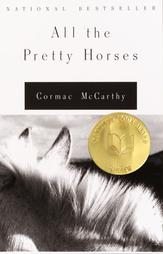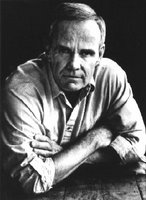
 Cormac McCarthy's
Cormac McCarthy'sAll the Pretty Horses
McCarthy is most probably the greatest writer of Western novels in American history, to such a degree that his novels also transcend the "Western" genre. He may write in the tradition of Zane Grey and Louis L'Amour, but he is certainly also an heir to America's towering literary geniuses, such as William Faulkner--from whom McCarthy learned his long, flowing sentences--and Ernest Hemingway, whose attitudes of heroic stoicism and quiet romanticism pervade McCarthy's prose.
McCarthy's great epic Border Trilogy--whose first novel, All the Pretty Horses, has become McCarthy's most famous--tells the story of cowboys in the middle of the twentieth century, men who pursue a romantic Western idea that has vanished and turned from history into myth. McCarthy writes about the dark and unseen side of the Western idea: you will read in McCarthy's novels what you will never see in most Western movies, stories about tragedy, cruelty, and blood without a heroic or redemptive ending. The irony of All the Pretty Horses is that it exposes characters desperately trying to inhabit the cowboy myth--to subscribe to the cowboy code of stoicism, understated nobility and great physical skill--in the realities of exploration in a savage and uncivilized land. What emerges is a picture of what the West might really have been, together with a picture of the human spirit under awesome moral pressure.



No comments:
Post a Comment